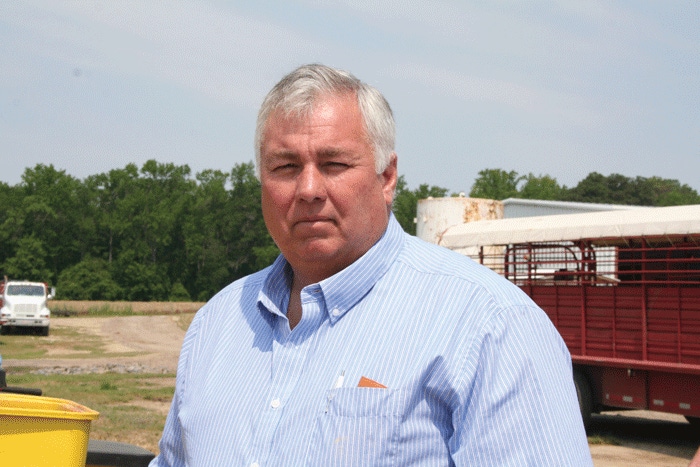July 6, 2011

When Vic Swinson got into the peanut business, he did it right and he did it big. But most importantly, he says, he got in it with the right person — his long-time friend, Jart Hudson.
Swinson, this year’s Farm Press Peanut Profitability Award winner for the Upper Southeast, now farms 1,500 to 1,800 acres of peanuts and several thousand acres of grain crops. His wife, Teresa; daughter, Katie; and son, Lee, are all integral parts of the farming operation.
The Mt. Olive, N.C., producer grew up on a tobacco and grain farm in Duplin County, and never thought of doing anything but farming. When he graduated from high school, he got a few acres of tobacco and few acres of cropland from his father, and has never looked back.
Getting into the peanut business was a bit serendipitous. He started growing cotton in the early 1990s and became a partner in a cotton gin. One of the partners is Jart Hudson, who farms in nearby Samson County. The two became good friends — more like brothers — and subsequently established and developed Four County Peanut Company.
Swinson developed an interest in peanuts from visiting with an uncle in Martin County, in northeast North Carolina. At that time, the allotment system was in place and Swinson had no way of getting into the peanut program.
He shared with Hudson his interest in peanuts and of helping his uncle from time-to-time with his peanut crop. When the allotment system went out, Hudson, who grew up in a peanut farming operation, helped Swinson get started with 300 acres of peanuts in 2003.
“That first year was a really good one, and we knew we wanted to get more involved in growing peanuts,” he recalls. Now, he and Hudson are among the larger peanut growers left in North Carolina.
The time was right
The business opportunity with peanuts and the cropping opportunity came together at the right time and everything just clicked to increase peanut acreage, Swinson says.
For a number of years their primary crops were tobacco and corn. “We just couldn’t seem to get better with corn — there wasn’t much going on with new varieties, and it just wasn’t very profitable for us,” he says.
In the early 1990s, they got into the cotton business, both growing and ginning; at one point they had 3,000-4,000 acres. “Ten years of growing that much cotton will wear you out,” Swinson jokes.
As they began to cut back on cotton acres, he says DeKalb in particular began to release really good new corn hybrids, so they got back into corn.
When the peanut program went away, Swinson had a lot of acres planted two ideal peanut rotation crops — cotton and corn. His best friend is a lifelong peanut grower, so getting into the peanut business big time was a natural thing to do.
The whole family is involved in the entire farming operation, but directly involved in the peanut end of it. Daughter Katie is a former Duplin County and North Carolina peanut yield champion, and son Lee is owner and operator of Golden Grove Candy Company.
Both inherited their father’s sense of entrepreneurship. It’s no stretch to figure out Golden Grove Candy Company makes peanut candy, which is now sold in retail stores across the country. Katie runs Wells Pork and Beef, a family-owned meat supply company that ships beef and pork products nationwide.
Teresa runs the family and helps with all the businesses. “She worked outside the farming operation for a number of years,” Swinson says, “and I kept telling her I needed her to help me on the farm. She used to say I didn’t have enough work to keep her busy — but I don’t think she would say that now.”
Profitability is important in any farming operation, but it’s not always the only driving force. A few years back Swinson got into the strawberry business.
“It’s one we should get out of, but our neighbors depend on us for strawberries, so we keep growing them. We plant the strawberries and our friends and neighbors pick them and pay on the honor system. It works just fine,” he says.
When they got into the peanut business, they were hauling peanuts 65 miles each way to a buying point at Elizabethtown, N.C. “It was a long way to haul peanuts,” he says, “and we had our share of flat tires and breakdowns — enough to start thinking about a better way to handle our peanuts.
“Jart and I began to think about building our own peanut storage and drying facility. We talked to a number of companies to get ideas about how to do it. Bo Willingham at Golden Peanut Company worked with us and gave us a good outlet to sell our peanuts. We looked at a number of operations in Georgia and got some ideas how we wanted our facility to operate.”
They built the facility and lease it to Golden. To make it work, he and Hudson have to grow a lot of peanuts, which fits well into their current farming operation, Swinson says.
He and Hudson, together, farm in four North Carolina counties; hence the name, Four County Peanut Company. The name of the peanut plant goes along with Tri-County Cotton Gin, in which he remains a partner.
Took some arm twisting
Getting his son involved in the peanut business didn’t take a lot of arm-twisting. “The first year we grew peanuts was the last year I tried to go to college,” Lee Swinson laughs. “I planted all the peanuts that year. It was a new crop, fun to grow, and I saw right away it was one we could add value to on the farm.”
Swinson grows his peanuts behind two years of corn. Hudson grows peanuts on a four-year rotation, which allows Swinson to grow more acres needed to keep the peanut company running smoothly.
This year, he will grow about 700 acres of cotton and will get cotton into the rotation on some of his land prone to nematode problems.
“I still like to grow peanuts behind corn so I can get the use of some of the residual fertilizer — that’s something my uncle taught me long before I started growing peanuts,” he says.
They grow all Virginia type peanuts and plant on 38-inch rows with a 12-row ripper/bedder, then come back with two 12-row planters. They plant NC-V11, Champs, Phillips and Perry varieties, shooting for the larger kernel varieties to sell under their trade name.
“We plant most of our Champs on heavier land that is irrigated, because they come off early and it helps spread out harvest,” he says. Currently, they irrigate 300-400 acres.
“In 2008, Katie won the North Carolina yield championship with over 6,000 pounds per acre, and these were under irrigation,” Swinson says proudly.
He typically begins planting in mid-May, using an inoculant on all peanuts. This year they used acephate (Orthene) in the water with the inoculant to try and replace Temik and Thimet, which are in short supply and being phased out.
One business decision Swinson made early on is to use generic products. “We typically get three to four prices on all the products we buy and generics have worked well for us. Over such a large operation, a few dollars saved per chemical, per acre saves us a lot of money.”
He sprays a generic version of Dual-Valor behind the planter, and if needed, Gramoxone and Basagran. Like so many North Carolina growers, he battles pigweed on a daily basis and uses as many herbicide families as possible to help slow development of herbicide resistance.
At bloom, they put down land-plaster. “The cost isn’t bad,” Swinson says, “but hauling it 100 miles and sending an empty truck back to the plant another 100 miles keeps us on our toes.”
Through all the growth and diversification of his farming operation over the years, he says one thing remains constant: “Take care of the land, and the land will take care of you. Farmers are the ultimate environmentalists — if we do our job right, the land will benefit, not suffer, from the crops we plant on it.”
About the Author(s)
You May Also Like






